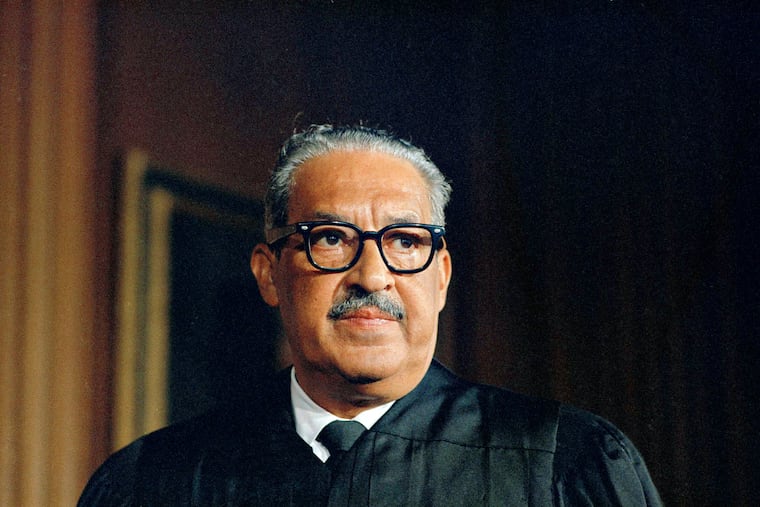The clairvoyance of Thurgood Marshall on the question of Roe
Marshall knew that the right to privacy outlined in Roe required heightened protection against government interference.

The voice of the late Justice Thurgood Marshall echoes throughout the dissenting opinion in the recent Supreme Court ruling that overturned Roe v. Wade.
Marshall valued the rights of women and the personal autonomy of people who are pregnant as expressions of human dignity. In 1973, he joined the majority in deciding Roe, which relied on well-established methodologies to determine that abortion was protected as part of the long-standing right to privacy. In Roe, Marshall knew that right required heightened protection against government interference.
But after Roe, in a series of decisions between 1977 and 1980, the court affirmed state and federal regulations that prohibited the use of public funds to pay for abortion services. The majority reasoned in Maher v. Roe that states could make childbirth an “attractive alternative” without infringing the constitutional rights of the person bearing the child.
Marshall protested because the restrictions penalized women for being poor. He contended that the cost of an abortion might as well be “one hundred times as great” for Americans living in poverty than those who did not. He expressed outrage at “the ethical bankruptcy of those who preach a ‘right to life’ that means a bare existence in utter misery for so many poor women and their children.”
Marshall also protested judicial endorsement of legislation that favored the state’s interest over personal autonomy. His prescient dissent to the majority decision in Harris v. McRae, a 1980 case that upheld federal restrictions on funding medically necessary abortions, warned that financial-based restrictions on access to abortion would not end the demand, but would severely limit a woman’s ability “to control the direction of her own life” as an equal citizen and drive women to seek unsafe alternatives.
Marshall chastised the court for ignoring the reality that poor women often face severe mental health, economic, and public health consequences when compelled to choose the “attractive alternative” of childbirth and parenting. Marshall concluded that judicial endorsement of regulations that unduly burdened the poor and stripped women of personal autonomy was unconstitutional and further exacerbated gender subordination at the intersection of race, gender, and economic status.
According to the Centers for Disease Control and Prevention, Black women account for the highest rate of unintended pregnancies and the largest percentage (38.4%) and ratio (117 abortions per 1,000 live births) of all abortions. Black women are three times more likely than white women to die in childbirth.
Restricting abortion access only increases their chance of death and intensifies the existing public health crisis in poor and minority communities that lack access to health care and often cannot secure adequate insurance.
So, it has come to pass. In stripping away a constitutional right, the majority on the court trammeled personal autonomy; ignored the realities of poverty, racial disparities, incest, and rape; and showed no regard for women who may seek unsafe alternatives.
“As a constitutional law professor, I am appalled to see the court ignore precedent.”
As a constitutional law professor, I am appalled to see the court ignore precedent (the doctrine of stare decisis is drilled into the psyche of every law student) to take away a right recognized as fundamental under the Constitution.
For more than 100 years, Americans have come to rely on the proposition that certain decisions surrounding the family and implicating bodily integrity should remain in the sphere of privacy under the protection of the Constitution. If we accept the erosion of our privacy in one instance, where does it stop? Will legislators further intrude in our bedrooms and go back to forbidding the use of contraceptives and dictate how to have sex and whom not to have sex with?
Will our bedrooms be subjected to pharisaic neighbors like the men in the Bible who dragged the woman (but not the man) from the bed and accused her of adultery in front of Jesus? Will our homes no longer be our castles?
And will we lose our religious freedom as well? A Florida synagogue filed a lawsuit challenging the new state ban on abortions as the establishment of religion and imposition of Christian nationalism in violation of the free exercise clause of the First Amendment. The highly publicized lawsuit argues that the law violates Jewish teachings that allow abortions to “protect the health, mental or physical well-being of the woman.” Islamic legal scholars affirm the acceptance of similar views. For that matter, there is no monolithic view among Christians on the propriety of abortion. Are we now a theocracy?
Through that prism, and Marshall would likely agree, the court’s decision skirts dangerously close to violating the free exercise and establishment clauses.
I understand and empathize with the plight of individuals and families making the difficult decision on whether to bear a child. And I am outraged that a fundamental constitutional right has been taken out of our hands and placed in the hands of mostly white male state legislators.
In the words of Thomas Jefferson, speaking of the inherent contradiction between equality and slavery, “I tremble for my country.” The clairvoyance Marshall proved — and how it speaks to the determination of the current court to base its jurisprudence on the meaning of the Constitution when women and people of color were viewed as property — makes me tremble for America.
The prophetic statement of dissent by Marshall in Payne v. Tennessee rings true: “Power, not reason, is the new currency of this court’s decision making.”
Wendy B. Scott is a professor and an associate dean at Elon University School of Law. She is the coauthor — with Michigan State University College of Law dean Linda S. Greene — of a forthcoming book on the dissenting opinions of Justice Thurgood Marshall.